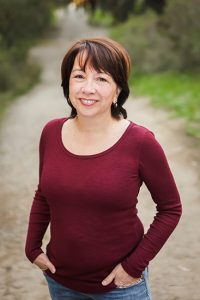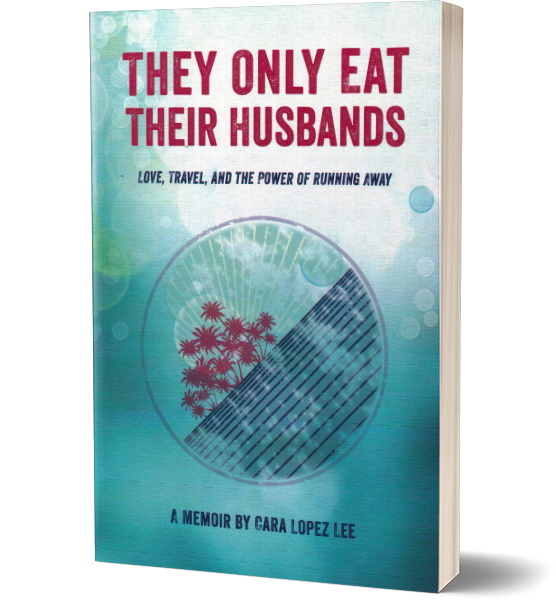Being open when we travel is like standing atop a cliff, enlivening but risky. One year ago tonight, friends and I celebrated my memoir with a release party. To mark that anniversary, I’m sharing with you a story that never made it into They Only Eat Their Husbands: A Memoir of Alaskan Love, World Travel, and the Power of Running Away…
THE LOWER 48
35 years old – near Rialto Beach, Washington
As I climbed the final steps to the promontory at Cape Flattery, the most northwest point in the Lower 48, a pair of hazel eyes looked into mine. The way he said “hi,” it was as if he’d been expecting me. “Hi!” I replied, smiling. We stared down at the noisy waves washing in and out of blue grottoes hundreds of feet below, and gazed out at the immeasurable expanse of water bearing down on the cape. The Pacific faced no obstacles from the horizon to this point, and its accumulated power was eating away at the green-draped cliffs atop which we stood.

We stared down at the noisy waves washing in and out of blue grottoes hundreds of feet below. (Dreamstime stock photo by Fallsview)
As comfortably as if we’d known each other for years, the stranger and I talked animatedly about the travels that brought us here. When I said I’d taken a swing-dancing lesson in Seattle, he said, “You’re kidding! You swing dance?” He grabbed my hand and swung me around atop the cliff, and my laughter entered the wind and waves. I felt the rock beneath us shuddering under the onslaught of surf.
Nick was a 30-year-old restaurant manager from back east, who’d quit his job to wander the States for six months. He said that, after his travels, he wants to open a restaurant in San Francisco. Then he blurted out a non sequitur: “I tend to be logical in my thinking.”
“That’s funny, I would’ve pegged you as more intuitive.”
“Really? Thanks. I’m trying to bring out that side of myself more.”
I said, “With me, you get both: logical and intuitive.”
Two travelers who’d spent too much time cooped up alone in their cars, we couldn’t let go of the conversation, until Nick said, “You wanna head into town and see if anyone’s hunting killer whales yet?”
The Makah Indians of Neah Bay, Washington are preparing to hunt an orca, as a step to reclaim their native traditions. They’re getting hassled by Sea Shepherd, activists who believe every whale’s life is sacred. The Makahs believe this, too. They simply draw a different conclusion.
When we arrived in Neah Bay, there were no Native Americans with boats or harpoons, no hordes of protestors — just two boys playing ball on the waterfront, while two Sea Shepherd boats and one Coast Guard vessel floated in the bay. A sheriff stood nearby, chatting with locals.
One young man pulled up in a car and asked the sheriff, “Are you going to arrest me?”
“No, the court’s closed today, so I couldn’t get a warrant.”
“OK, see ya later!” The young man smiled, waved, and drove away.
Amused, Nick asked the sheriff, “Does that happen often?”
“Oh yeah. One night I sat in front of the house of this guy who was wanted on drug charges. I just sat there for a couple of hours doing paperwork on an unrelated call. I was just messing with him. The next day he turned himself in. He couldn’t take it.”
“Do you like your job?” Nick asked.
“I love it. I’m Andy Mayberry.”
“So is anybody doing any whale hunting out there?” I asked.
“No, not yet. The seas are too rough for good whaling.”
He assured us the whalers weren’t waiting for Sea Shepherd to leave, or for the three live trucks from the Seattle TV stations to leave, or for the fuss to die down. They were just waiting for the right weather, calmer seas, and an easy whale. “When the conditions are right the tribe will get their orca, regardless of what anyone else does or says.”
Nick said, “I think the Makahs should be left in peace. It seems to me Native Americans have been practicing wise use of resources for thousands of years. Let them hunt a whale if they want.”
Since Nick and I were both heading south, we tag-teamed down the coast. We watched the sunset red and rock-wild at Rialto Beach, and agreed to camp at a nearby campground, in separate tents of course.
While we were setting up, it started to rain. As I wrestled with my tent, it kept listing over into the mud. I was getting wetter and muddier by the minute. Then the zipper got stuck. Laughing, Nick offered to let me sleep in his tent. This struck me as unwise, and I politely declined.
However, once we finished it was still raining hard, so if we wanted to talk we’d have to sit inside a tent together. Nick chuckled at my trepidation as I stepped into his roomier tent. “Don’t worry. I know you’re wondering, ‘What if this guy’s a psycho or something?’ But I really am the normal, nice guy that I seem. You’re perfectly safe.” Typically, his comment would have worried me more, but I did feel safe. Besides, we weren’t completely alone. There were other people in the campground.
We talked for hours. I told him I was going to LA to stay with my father and two-year-old half-sister, whose mother recently died. Then I told him about the recurring coincidence in our family:
My grandmother’s mother died when my grandma was two. My grandma ended up being passed around among relatives who used her in Dickensian fashion — as a housekeeper, babysitter, and unpaid waitress. My father never knew his natural father, who disappeared before my dad was born. My dad grew up in poverty with a single mother until he was ten, when he gained an adopted father who believed in the belt. My parents divorced when I was two. I spent most of my childhood with my grandparents. Actually, I spent most of my childhood being tossed around like a hot potato…“Anyway, Iliana is two, and her mother just died. I guess I kind of worry what’s going to happen to her.”
“So now you’re going to LA to help take care of her. Do you ever think you might be trying to go back and save yourself at two years old?”
“Of course.”
“Well, OK then,” he said with a smile.
Nick said traveling was changing him. He was learning to take life slowly, although his mind was still working at high speed. He had several ideas for restaurants. He was so easy to talk to, I didn’t mind when he made a pass. In fact, I wanted him to kiss me.
Nick was one of those guys who seem to think that painfully mashing a woman’s lips signifies passion. I didn’t mind that too much either… until he bit me. As necking etiquette goes, I don’t mind a nibble now and then. But, with no provocation, he chomped down on my lower lip, hard, and hung on. At the first opportunity, I retracted my lips, made some excuse about being tired, and retreated to my tent.
Minutes later I was zipped into my sleeping bag with my Swiss Army knife clutched in my fist. Our connection, if not my skin, was broken. I was relieved when the first dusty motes of morning leaked into my tent.
Nick was still asleep when I began pulling up stakes, hoping to finish before he woke. But soon he was up and packing, as well. We exchanged polite greetings and offers of assistance, but were otherwise silent.
After we packed, he walked up to me, laid his hands gently on my shoulders, and kissed me goodbye. I gave him a jerky little peck, like a parakeet. He studied my face, and then let go a guffaw that made me blush. The next instant he nearly knocked me over with the kind of bear hug one might expect from an old friend, gave me a sly wink, and wished me a safe journey. I muttered an incoherent response. Then he drove away.
I sat heavily on a log. “What were you thinking?!” I scolded myself. I flipped through a dozen photos of terrible things that could have happened to me, spending the night in a campground with a strange man. He could have bashed my head in with a rock and thrown me into the Pacific, where sharks would have chewed my face into anonymity before anyone even wondered what had become of me.
When I got in my car and looked in the rearview mirror at my round, sunny-side-up eyes, I laughed — at my runaway imagination, my embarrassment, and the fact that I was alive. “He was just a bad kisser,” I said, and giggled until I cried.
Today, I’m once again moving south, hopefully wiser than yesterday. Although experience, I’ve found, is no guarantee of wisdom, and foolishness no guarantee of death.
***
(I’ve changed names in the above story to protect people’s privacy.)




